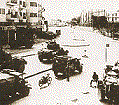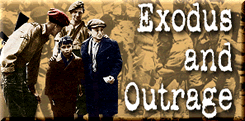The Kalaniots - The 6th Airborne Division in Palestine
When the war in Europe ended in May 1945 the 6th Airborne Division were at Wismar on the Baltic. The 6th were tasked for operations in the Far East but with the surrender of Japan, these arrangements were revised. On September 21st 1945, divisional and tactical HQs of the 6th Airborne Division flew out to Egypt and established themselves near Gaza, to be followed by the rest of the Division between September and November.

Palestine in 1945 was administered by Great Britain under a mandate from the League of Nations dating from 1923. The 1939-45 war had overshadowed the 'Palestine Question' and apart from Arab extremists and the Jewish dissident groups, the vast majority of Jews and Arabs were too busy to pursue it. Many Jews had fought in the British Army, so by 1945 Palestine Jewry had acquired a great deal of battle experience-and also one way or another, a considerable supply of arms and ammunition.
Of all the burdens cast on British soldiers by politicians, Palestine was one of those heavy burdens and into this situation came the 6th Airborne Division, as open minded a body of troops as any in the world, who had many Jews in their ranks in the battles against Nazi Germany. Even as the battalions moved into tented camps south of Gaza in 1945, Jewish newspapers were describing them as 'oppressors' and 'Gestapo' come to persecute the Jewish people. There were a number of Jewish military or para-military formations. Hagana, the underground.

National Army and closely linked to Hagana was Palmach-the spearhead group. This force was used by the Jewish authorities for acts of sabotage. There were two other dissident groups who answered to no authority but their own leaders. These were Irgun Zvai Leumi (IZL) and the smaller even more extreme Stern Gang. During October 1945 tension increased mainly due to the to the immigration issue and the 6th Airborne Division was widely deployed on internal security duties. The 3rd Parachute Brigade was sent to Lydda District, which included Tel Aviv; the 6th Airborne Landing Brigade went to Samaria, and the 2nd Brigade remained at Gaza. November 13th the white paper on Palestine was published. It dodged the issue of a Jewish homeland causing bitter disappointment among the Jews. A 12-hour strike and rioting was called for in.
Tel Aviv. The Palestine Police could not cope so the 8th Battalion Parachute Regiment was called in. As violence spread, the whole of the 3rd Brigade became involved and order was not restored till November 20th. C Company, 8th Parachute Battalion, veterans of the European war, had been standing by in a nearby barracks all day. They came in four slowly moving, uncovered 3-ton vehicles with horns blaring and the men displaying their bayonets and the signs with the message in three languages, 'Disperse or we fire'.

The effect was magical. The crowd dissolved at speed. The soldiers then leapt out to complete the clearance of the square. It was all achieved with no injuries to either side. The Tel Aviv riots heralded a conflict between the 6th Airborne and Zionism and in a thankless role the Parachute Division earned them the nickname of 'Kalaniot' -the red poppy with the black heart. , On the night of April 25th 1946, members of the Stern Gang attacked a lightly guarded military car park and deliberately murdered seven soldiers of the 5th (Scottish) Parachute Battalion. The 'car park murders' were shocking and destroyed the goodwill and trust, which had existed among the British troops and the populace up till then. Far worse outrages were committed later on, which is presumably what the terrorists wanted. Off duty soldiers still walked out unarmed to avoid looking warlike and not to upset the newly settled Jews. For the first time outrage acquired true meaning. All this time the terrorist campaign continued. Frequently towns and villages had to be searched for wanted men or arms and photographers would be on hand to provide the New York newspapers with fresh evidence of British 'brutality'.' Every time a British soldier is killed in Palestine,' wrote the American playwright Ben Hecht, 'I make a little holiday in my heart'. Such was the Zionist propaganda machine, but always the cycle of events came back to cordon and search. The reinforced 6th Airborne, now with the 1st Parachute Brigade under its command, with 5 brigades, three-armoured car regiments and supporting units, searched the whole of Tel Aviv, a city of 17,000 people.
By now the future of Palestine was before the United Nations and a new danger threatened Zionism-the Arabs. Hagana and Palmach turned their energies towards the defence of Jewish lives and properties. The Stern Gang however, motivated more by blind hatred than patriotism, intensified their attacks on the British and later turned to massacring Arab civilians. The Jews hated the Paras and labelled them anti-Semitic. They took to calling all Paras 'Kalaniot', the hebrew word of the poppy, a red flower with a black heart.
In the summer of 1947 the UN Special Committee toured Palestine eagerly supported by the Jewish Agency but boycotted by the Arabs. Their report recommended partition and this was carried by 33 votes to 13 with 10 abstentions. The decision was made and the UN washed its hands of the affair. The date set for laying down the mandate was May the 15th 1948. The final months saw the 6th Parachute Division's role change from one of peace keeping between Jews and Arabs, who were being reinforced by gangs from Iraq, Lebanon and Syria. Busloads of Jews were frequently rescued from ambush by Parachute troops.
'The Car Park Murders'
Taking advantage of the British reluctance to disturb the normal flow of life, the Stern Gang struck a savage blow on April 35th, no doubt as revenge for their previous setbacks. Army liberty vehicles still brought their loads of intending revellers to Tel Aviv. The vehicles parked near the sea front under the protection of a guard of eight men, who when not on sentry duty, occupied some tents that were overlooked by houses on three sides. Just after dark on the 25th the gangsters quietly entered one of these houses and held up its occupants. The men of the 5th (Scottish) Parachute Battalion on guard duty had no cause to know of this until automatic fire slashed down on them from an upper window and a grenade landed in one of the tents. Next the gangsters were inside the tents shooting everyone inside. Seven soldiers lay dead or dying. So outraged were the comrades of the dead that they indulged in their own private, but far from lethal, reprisals on a Jewish settlement. For this they were punished. There was no punishment for any Jew in Tel Aviv.

By this time the 2nd Parachute Brigade returned to the UK and the 3rd Parachute Brigade was disbanded. Amalgamations at this time reduced the battalions to six: 4th/6th, 5th and 7th forming the 2nd Parachute Brigade; and the 1st, 2nd/3rd and 8th/9th forming the 1st Brigade. With the withdrawal of the 2nd Brigade, the 6th Airborne Division had now only one parachute brigade under command. In Haifa, fighting took place regularly between rival populations, with the Parachute Battalion deployed between them and with the departure of the last Parachute soldiers in mid-May, Britain's brief role in Palestine's long and troubled history was over. The bulk of Airborne troops sailed from Haifa in April while the last Airborne unit to embark was 'B' Troop, 1st Airborne Squadron Royal Engineers. On arrival in the UK, the 6th Airborne Division was disbanded. In the reduction of the services to peacetime levels, it was decided that Airborne Forces should now be reduced to a single Parachute Brigade Group. In February 1948 the 2nd Brigade was designated the 16th Independent Parachute Brigade Group, with the numbers 1 and 6 perpetuating those of the 1st and 6th Airborne Divisions. The 6th Airborne Division suffered a total of 58 personnel killed and 236 wounded during their stay in Palestine.



